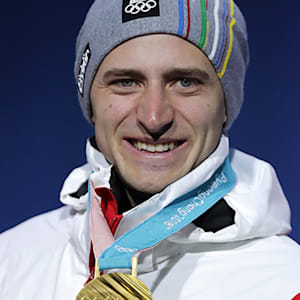Matthias MAYER
Biografía
Austria's Matthias Mayer, a skier with great technical finesse, did not have a single World Cup title to his name when, aged 23, he became Olympic downhill champion at Sochi 2014. At PyeongChang, four years later, he repeated his achievement, beating the Norwegian favourites to take gold in the super-G.
Olympic dynasty
Matthias Mayer embodies the Olympic spirit perfectly. The skier from Carinthia, born on 9 June 1990 in Afritz am See, performed faultlessly at the Games to enter the Olympic record books alongside the biggest names in Austrian skiing. A hugely talented athlete, he is the son of Helmut Mayer, a former Olympian who won the silver medal in super-G at the 1988 Games in Calgary, behind Frenchman Frank Piccard.
Gold in downhill... specialist in super-G
During the 2014 Sochi Games, Matthias was one of the outsiders for the downhill contested at Rosa Khutor on 9 February. On a very winding course, his abilities as a super-G specialist proved invaluable, and his highly fluid style, combined with his compact stature (179cm), allowed him to cross the line finish line a hair's breadth ahead of two other super-G specialists, Italian Christoph Innerhofer (by 0.06 seconds) and Norwegian Kjetil Jansrud (by 0.10 seconds). Matthias became the seventh Austrian to win the Olympic downhill and the first since Fritz Strobl in 2002. Given his young age, he immediately entered the record books among the greats of downhill skiing, a highly prized discipline in his country. This victory was in fact Matthias’ first major international success. He had previously mounted the World Cup podium just twice, first a year earlier in Kitzbühel with silver in the super-G, then for another silver in the downhill at Beaver Creek in December 2013.
Highs, lows and injuries
The post-Olympic period brought a succession of highs and lows. First, in March 2014, immediately after his victory in Sochi, Matthias won his first World Cup race by dominating on the difficult downhill course at Lenzerheide during the World Cup finals. But the following season began with a knee injury sustained in training. After several difficult weeks, he returned to winning form again in Saalbach with a downhill/super-G double. His 2015-2016 season ended prematurely after a heavy fall during the downhill in Val Gardena on 19 December 2015. The Austrian landed on his back and broke two vertebrae, despite his airbag inflating, which no doubt prevented an even more serious injury. He was then out of action for months.
A prestigious win in Kitzbühel
Alpine skiing fans had to wait until January 2017 to see Matthias competing at his best level again. And it was in Kitzbühel that he returned to the top step of the World Cup podium, with a victory in the super-G, which came with the honour of a gondola in his name on the cable car that runs to the top of the Streif. The 2017-2018 season confirmed Matthias’ return to form with numerous podium finishes at Lake Louise, Wengen, Kitzbühel again and most notably Val Gardena, where he seemed to take revenge on the Sasslong run on which he had fallen heavily two years earlier. But it was at PyeongChang 2018 that he would return to his previous heights and establish himself as one of Austria's greatest Alpine skiers of all time.
A scare before a new Olympic triumph
The Olympic fortnight did not start well for Matthias. On 13 February, during the combined event, he placed a very acceptable third in the downhill. Unfortunately, during the slalom a few hours later, he fell on the steep section of the course. Having hurt his hip, it was uncertain if he would finish the course. But the robust Austrian skied into a respectable ninth place. The next day, on 15 February, the sun returned to Jeongseon for the super-G event, and Matthias skied faultlessly, managing to build up an enormous amount of speed on the middle part of the course. His technique allowed him to take the many undulations in his stride and to record the best time: 1:24.44. "I had to work a lot with the physio to heal my injured hip," he explained. "But I didn't think about the injury today. When I completed the last jump, I knew that I had put down a good run. And that made me push hard on the last two gates." He won with a lead of 0.13 seconds over Switzerland's Beat Feuz; the Norwegian title-holder Kjetil Jansrud finished in bronze medal position, 0.18 seconds down.
One of the greats
With this second Olympic gold, Matthias Mayer joined his magnificent namesake Hermann Maier, who, until this point, had been the only Austrian to win gold in the discipline (Nagano 1998). But more impressive still, he became only the second Alpine skier ever to win gold in both the downhill and in the super-G at the Olympic Winter Games, after Norway's Aksel Lund Svindal, who won the super-G at Sochi and the downhill at PyeongChang. Now it is Matthias' turn to build a record of achievements as impressive as that of these two skiing greats. A few major victories could put him in the ideal position to target a third gold medal at the Beijing 2022 Games, where he will be just 31...
Destacado
Matthias MAYER
Repeticiones
Resultados olímpicos
Athlete Olympic Results Content
You may like

